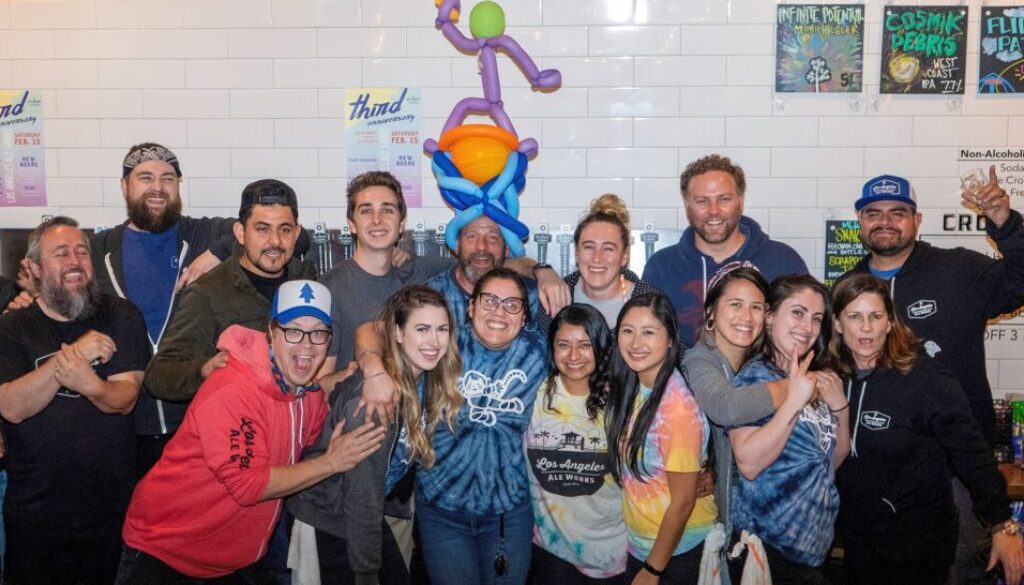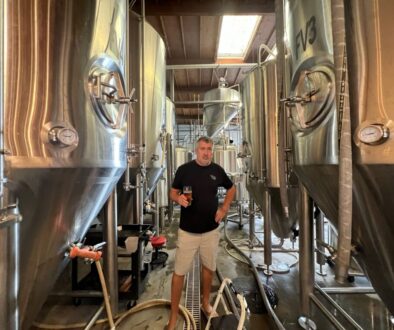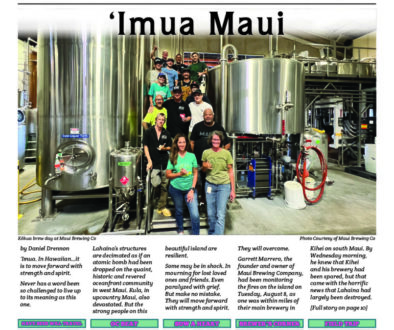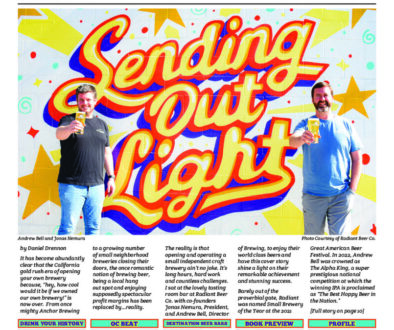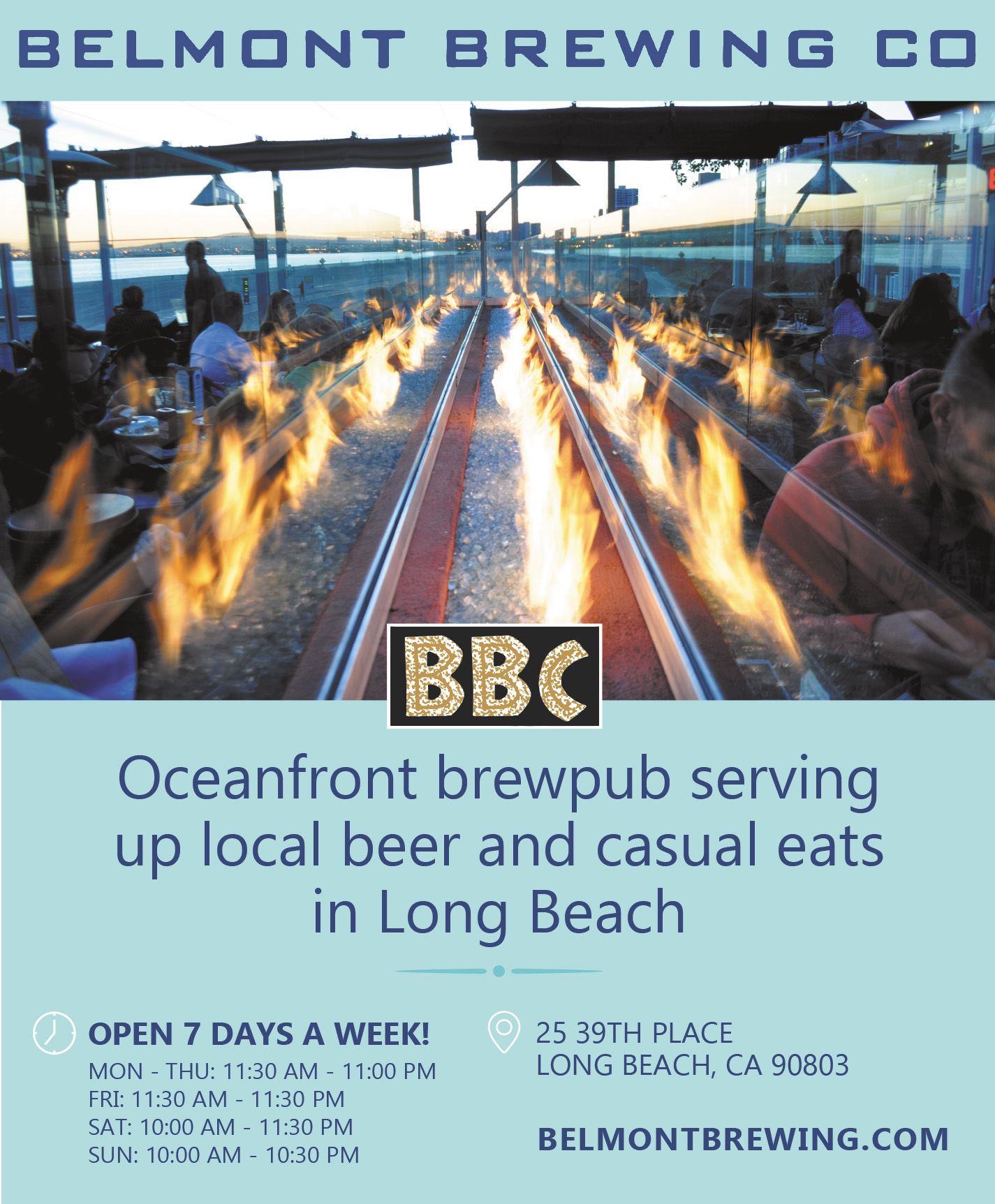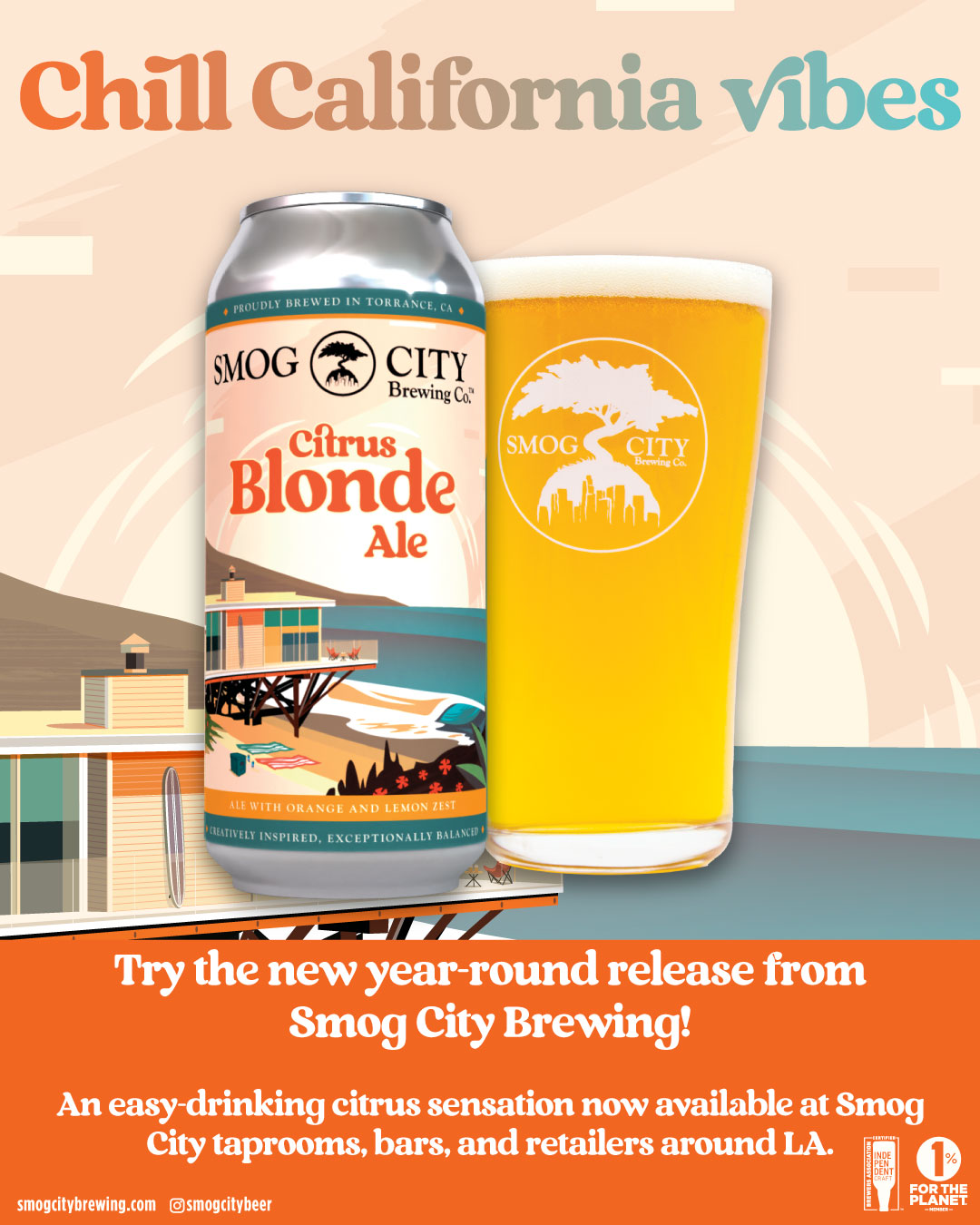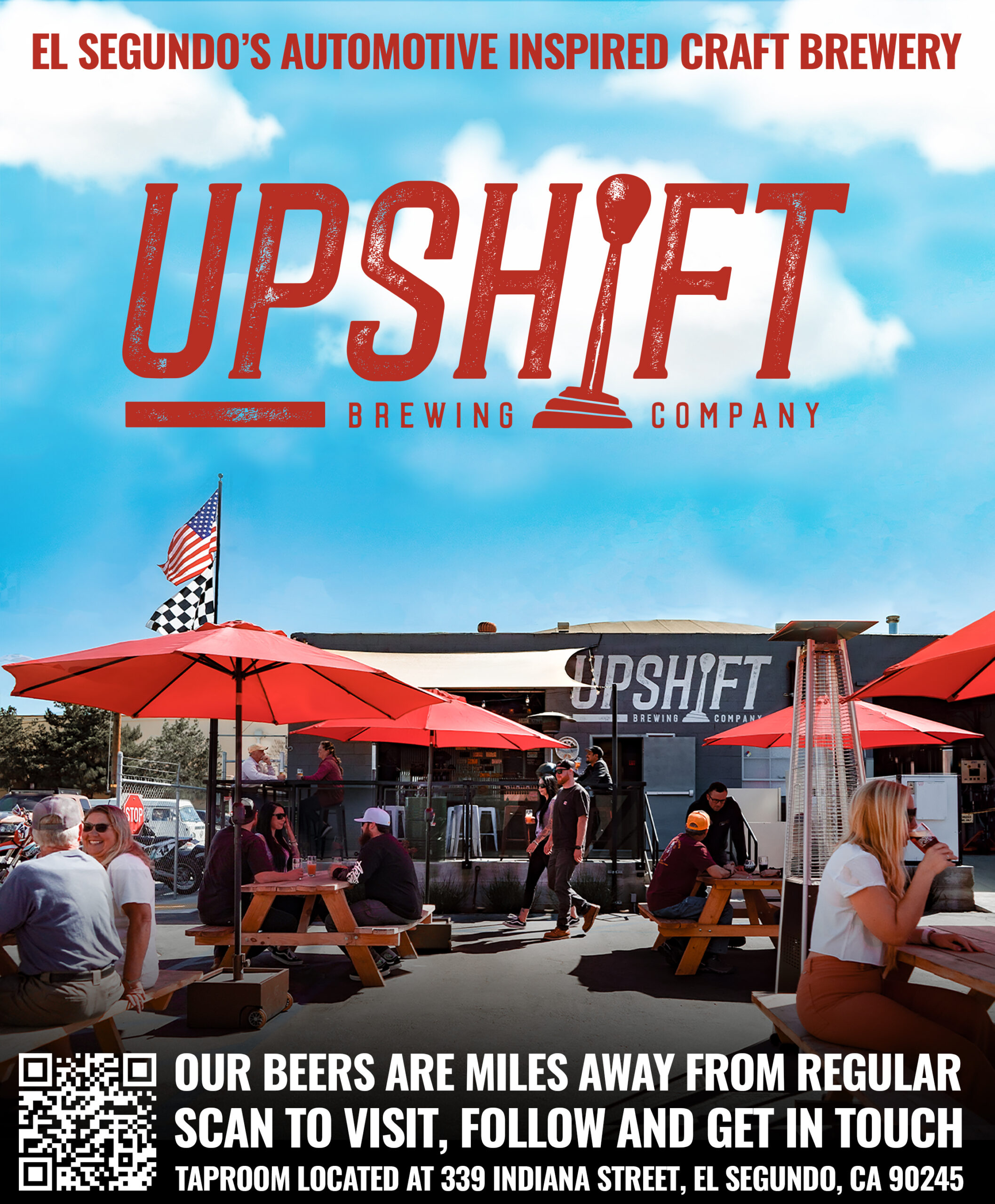L.A. Strong: Los Angeles Ale Works Thrives on Teamwork
Four years ago, LA Ale Works opened a hop, skip and a jump from The World According to Elon Musk, aka SpaceX. In a virtual rocket launch of an exploding local brewery scene which blew up from a meager four breweries in LA County ten years ago to nearly 100 today, Los Angeles Ale Works, which had been contract brewing at Ohana Brewing while finding financing and looking for a home, landed in a community that, at that time, had no local brewery to call its own…Hawthorne.
Partners Kristofor (Kip) Barnes, the brewmaster (and beer writer!!!), and Andrew Fowler, the business manager, came together with a vision for a brewery that put teamwork before individual accolades, and the result has been that they have created a family-type atmosphere among their employees as well as their super loyal patrons.
Unfortunately, thanks to the “damnemic” that is seemingly interminable, I was not able to interview these two friends in their cozy taproom sipping through their exceptional line up of carefully crafted brews, but here are their answers to my emailed questions.
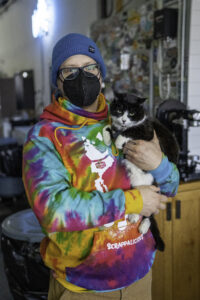
Photo Credit: Matthew Garcia
@MomentsInBeer
DRENNON: Kip. Did you start homebrewing while at USC and what was your major?
BARNES: I graduated with a BA from the Film & Television school in Critical Studies, basically critical writing for film. I actually got into homebrewing a few years after graduating from USC, but with a college friend of mine you may know, John Rockwell. John brought some of his homebrew on a camping trip to the Sequoias and I thought it was awesome. I started home brewing with him shortly after.
DRENNON: You were in the world famous Trojan marching band. What instrument did you play and how was that experience?
BARNES: I guess this counts as a beer related question. We did drink plenty of beer…though it wasn’t good beer. Playing Trombone in the Trojan Marching Band (TMB) was an amazing experience. I was able to travel the country with the team and also internationally. I have very fond memories of Hong Kong and the Aichi Expo in Japan. Also, there’s something that happens when you play with a group that big. It’s pretty awesome, but everyone needs to work together to make it happen correctly.
DRENNON: Well, it was a brewing-related question in the sense that there are so many brewers that are musicians, seemingly every single brewery in LA can field its own band for the Battle of the Bands held annually (note: except during pandemic years) during LA Beer Week. What do you think is the nexus between music and brewing?
BARNES: Can I tell you a secret? I’ve never been to the Battle of the Bands. I’ve always wanted to make it, but it just never synced up. Hopefully we can change that one of these years. Playing music is really collaborative. Everyone needs to play their part while also listening to everyone around them. It’s an exercise in multitasking. Making beer has a few crossovers in my opinion. Beers need to have a balance in them, with all the different parts playing together harmoniously. The team that creates those beers also needs to work together in collaboration. Only when we’re all working together, are we able to get the job done. Music has a way of being relatable in all fields. It’s emotive, mathematical, and very technical.
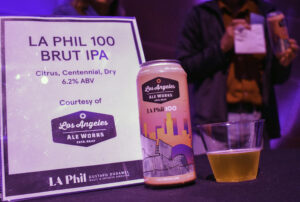
Photo Credit: Sarah Bennett
DRENNON: On the topic of music meeting up with beer, you pulled off a collaboration brew with the LA Philharmonic! What precipitated that super cool collaboration? Will we continue to see that beer?
BARNES: The LA Phil 100 beer was an incredibly exciting project. I’m very proud of that one. It started, as many things do, with the LA Brewers Guild. We donated beer to one of the Hollywood Bowl events and I was able to meet with Fran (Franny Lopez, LA Brewers Guild Executive Director) and the LA Phil team to talk over an idea. From there we formulated a plan with my partner, Andrew Fowler, the LA Phil team, and a couple of the musicians from the Phil, Chris Still and David Rejano. The beer turned out fantastic despite its fringe style, Brut IPA. We’ve concluded our LA Phil 100 run, but the beer may find its way back into our portfolio.
DRENNON: I was a fan of that beer and most Brut IPAs, really enjoying the dryness. So I hope they re-emerge. You became active in the local craft beer scene when it was in its nascent stage. Correct me if I am wrong, but I believe we first met at a formation meeting for the LA Beer Bloggers group at Steingarten (now The Stalking Horse) on Pico back in what, 2012? Maybe even earlier?
BARNES: Yeah, you may be right. I recall us meeting at Strand Brewing for an event. I can’t remember what it was for, but there was charcuterie and beer involved. I look back on the days of us all writing about the burgeoning beer scene in Los Angeles. It was a really cool time to be involved with the breweries, beer bars, and other writers. I think at that time there was far less competition in the industry so beer writers were eager to cover the intense amount of positive energy everywhere. The LA Beer Bloggers, now LA Beer Media, was designed to be a group of writers that would get together to talk shop and hopefully lift each other up. We also tried to connect writers that may have not had access at the time to the brewers they wanted to talk to. Side note: The first LA Beer Bloggers event was at Eagle Rock Brewery and that is where I met the lovely Erika Bolden, who I get to work with now at LAAW.
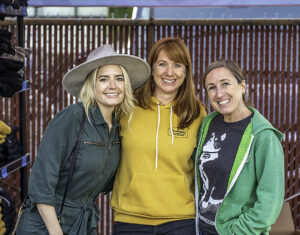
Photo Credit: Matthew Garcia
@MomentsInBeer
DRENNON: Those early days of LA beer scene were super fun and Erika is awesome! I recall you wrote a book detailing all of the regional breweries back then. What year was that, how many breweries were there at the time and what was that experience like, especially given that you had a dream of opening your own brewery?
BARNES: Writing a book, and being paid for my writing for the first time, was a wild experience. I wrote it in 2013, which was a really busy year with the LA Ale Works Kickstarter and the start of the contract brewing business. I was given an incredibly short deadline to visit all breweries and all reputable beer bars in Southern California. Firestone Walker Barrelworks was as far north as I went. I had to balance visiting, writing, and working my day job. Some weekends I’d travel to 20 or so places a day and I still have all my journals from each visit. I had to get better at tasting, managing my alcohol intake, taking detailed notes, asking thoughtful questions, and following a timeline. In 2013, I believe I visited around 80 breweries, around 15 of those were in LA County. Times have changed, haven’t they? There was huge growth in the industry at that time, which made it seem like a great opportunity for getting LA Ale Works off the ground, but the road ahead was still challenging.
DRENNON: Was there an epiphany moment when you realized you wanted to open your own brewery?
BARNES: Not to sound trite, but I decided I wanted to open a brewery shortly after brewing my first homebrew. I indoctrinated myself into the subculture, bought books, read them all, interviewed brewers, brewed as much homebrew as I could, won awards, put together a business plan, and incorporated Los Angeles Ale Works, LLC at the end of 2010. The only issue was finding the money, and that would prove to be the biggest challenge for the next six years.
DRENNON: Let’s bring in your indelibly dapper, incredibly nice partner Andrew Fowler, he who runs the business side of LAAW. Why did you guys choose the Los Angeles Ale Works name and what was the location scouting process that landed you in Hawthorne?
BARNES: Los Angeles Ale Works came to us while we were putting together our original business plan in 2009. We knew we loved Los Angeles and we knew that we wanted the brewery to be tied to our location. We trademarked the name and my dad created an awesome logo we used until we opened in Hawthorne. Most of the locations in Inglewood and West LA we liked were not available so we had to expand our search. I still remember when Andrew brought me to this little brick building in Hawthorne. Love at first sight. We considered changing the name, but we had built so much traction with Los Angeles Ale Works that it didn’t make sense.
FOWLER: The scouting process was long and arduous. We had looked at DTLA, Culver City, Lawndale and Inglewood, among many others. We were getting priced out, couldn’t find the right fit, or hit roadblocks with the various cities. Deep into the search I was getting lunch with a friend from SpaceX who suggested we look behind their headquarters in Hawthorne. Unbeknownst to us there were these beautiful brick bow truss buildings that reminded me of my roots in New England. It took six-plus months of begging for a landlord to consider us – most thought we were crazy. The rest is history; the City of Hawthorne and the community have been one of the most welcoming places. We can’t imagine the journey ending any other way.
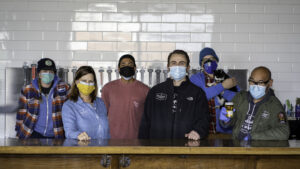
Photo Credit: Matthew Garcia
@MomentsInBeer
DRENNON: LA Ale Works just turned four years old. What has been the learning curve, both as a first– time small business owner and as fledgling professional brewers?
BARNES: Homebrewing and professional brewing are very different animals. When you homebrew, you brew for yourself. When you brew at a brewery, you brew for everyone else. I think once you understand that, it’s easier to move forward. I hear many brewers lament that their favorite beers are not the customer favorites. C’est la vie. Managing is a challenge for me. We hire incredibly talented people who all bring unique skills to the team and I’m super grateful for the team we’ve assembled. But knowing what to say and when to say it has been a steep learning curve for sure. If playing trombone taught me anything, it’s practice makes perfect. I work to improve every day.
FOWLER: It has been STEEP. When we first started, Kip and I were trying to do every task, which isn’t sustainable. It also prohibits growth. One of our goals out of the gate was to create a culture among our employees where they want to come to work and they know there is a future career path. As a result of that commitment, our original Beertenders are working in sales, production and on the administrative side. We promote from within whenever possible but it is our culture that has allowed us also to attract outside talent with the likes of (brewers) Rian Van Nordheim, Rob Scott and Andrea Bermudez. This culture has grown into a family over the years and that family just keeps growing. We are exceptionally proud of this achievement. Why is that important? Well, when this little thing called COVID hit we reinvented our business four times over (at least). Our staff switched roles, wore different hats, and took ownership which allowed us to focus on running the business and keeping our heads above water. You could write a business school case study on what we went through in 2020 and we absolutely could not have done it without the support of our family.
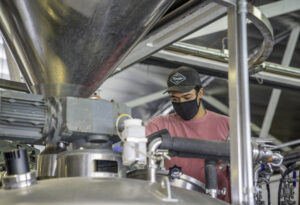
Photo Credit: Matthew Garcia
@MomentsInBeer
DRENNON: Love hearing that and that camaraderie shows when you are visiting LA Ale Works. What, if anything, would you do differently with the knowledge you now have?
BARNES: I focused entirely on brewing beer and making a great product. I think if I could turn back time, I’d probably have majored in business and marketing. This would give me more skills to undertake the challenges ahead. That being said, if I had done that, maybe I wouldn’t be where I am! No regrets.
FOWLER: We don’t have regrets – you need to live life to the fullest! We landed in an amazing community and we have a remarkably dedicated team.
DRENNON: What are you most proud of after your first four years?
BARNES: We touched on this before, but we have an incredibly talented group of people working here at Los Angeles Ale Works. This isn’t a brewery headlined by some hot shot brewer or an affluent restaurateur. We’re a collective of talented people each bringing their unique skills to the company, with a common goal of elevating the company and everyone with it. Our turnover is extremely low which says something. Customers enjoy our beer, our atmosphere, but most importantly the people working here.
FOWLER: Hands down it is our team. Second is the community that has been built around our brewery. We wouldn’t be here today without the support of both.
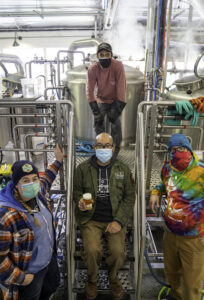
Photo Credit: Matthew Garcia
@MomentsInBeer
DRENNON: You mentioned them above, but as LA Ale Works has grown, you have brought in a couple of local pro brewers, Rian Von Nordheim (formerly of Stone Brewing and Brouwerij West) and Rob Scott (formerly of now defunct State Brewing). Can you speak to what they bring to your team and, for those of us who are not brewers, how you divvy up recipes and brewing responsibilities?
BARNES: We were especially fortunate to add Rian to our team. She brings a wealth of knowledge, experience, and organization to our growing company. I’ve learned a lot from her over this last year and she’s been integral in figuring out how to grow our output and also revamp our documentation. We’ve known Rob for a bit as a neighbor (at State Brewing) and were super excited to bring him on board. He brings creativity, passion, and energy. He thinks outside the box and is always willing to go above and beyond. As far as recipe formulation goes, we’ve always taken a creative approach to it. One of us puts a recipe shell together and we all talk about it to see if we have ideas. I had Rian handle our Christmas beers this year and Rob lent his complete expertise to the art of milkshake IPA.
DRENNON: Do you have a brewing philosophy and/or a mission statement for LA Ale Works?
FOWLER: It is our little tagline, ESTD (Established) Daily. Each day we want to establish ourselves as the best we can be in four areas – Community // Creativity // Quality // Beer. It’s a simple but easy reminder to help us continually improve no matter what happened the prior day.
DRENNON: Needless to say, 2020 was a nightmare for small independent breweries. How did you guys navigate the ebbs and flows of closures, regulations and restrictions?
BARNES: It’s definitely been a challenge to manage Covid closures. On the production side we haven’t stopped moving. At the start of the pandemic, we actually increased production and were packaging everything in 16 oz cans. It wasn’t until November that we officially slowed production down a bit. Our goal for 2021 is to be very focused and calculated with what we produce and package. It’s sad to see our taproom and patio empty and equally sad not to have all of our friendly taproom staff working here on a daily basis.
FOWLER: One week at a time was really all we could do. A lot of tough lessons were had along the way, but they made us stronger as a team and company. Between our canning line and being self-distributed it allowed us to be very nimble and roll with the punches. That, combined with the support of our retail partners, has kept us pushing forward despite the chaos.
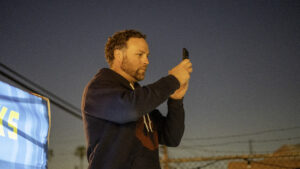
Photo Credit: Matthew Garcia
@MomentsInBeer
DRENNON: What are your goals and what is your vision moving forward?
BARNES: We’ve got to get through this. This year, it is our hope to finally open our new taproom at Ivy Station in Culver City. I’m not sure what that opening will look like or what restrictions may be like at the time, but hopefully we can make it fun. We’re going to continue to fine-tune our more flagship beers and increase local distribution.
FOWLER: Like Kip said, we are pushing forward with our new location at Ivy Station in Culver City. The development will be a game changer for that part of the city when life returns to normal. The support we have seen without opening is amazing. Also, we haven’t really dabbled in the beer competition side (it’s EXPENSIVE!) so we plan to refine a few core beers and dip our toes into that this year. Outside of that we want to continue to focus on pushing ourselves to be the best that we can be as people and a brewery.
DRENNON: Between talent and work ethic, which is more important?
FOWLER: We start a lot of interviews with “Have you ever plunged a toilet?” At a small company everyone needs to chip in, right down to ownership. That’s the type of work ethic our team has — everyone pitches in regardless of the task. The irony is the people with that work ethic are also the most talented. There goes the secret sauce.
BARNES: I’d definitely agree with that. We want people to be somewhat autonomous so that everyone can put their own stamp on what they’re doing. That’s one of the reasons our team is so special. We have a ton of great people that all seem to really enjoy working here and everyone is like-minded in trying to build this dream that is LA Ale Works. This industry seems to attract a certain type of individual and LAAW attracts really good people from that subset. Our goal is to build on talent that our employees bring to the table and continue to support their personal growth as they grow with us.
DRENNON: What are you most excited about for 2021?
Fowler: Right now, it’s our 4th Anniversary Celebration. Unfortunately, no crazy party will happen this year but we have a ton of special releases planned throughout the month, including another set of collaboration beers with artist Brady Smith and a new Juicy IPA with the band Fortunate Youth. We are also super excited about our 2021 Bourbon Barrel Aged Series. We had a great response in 2020 so we doubled down with six different beers releasing in February.
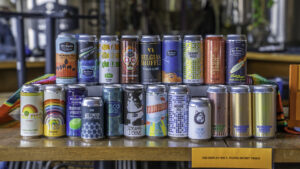
Photo Credit: Matthew Garcia
@MomentsInBeer
BARNES: Isn’t it crazy that it’s been four years? This last year seemed simultaneously like a blur and as if it would never end. 2021 is the year where the world hopefully returns to normal and us with it. One step at a time. We’re excited to open our second tasting room and yes, celebrate the four–year mark. When we can get back to seeing our friendly customers in the taproom and throwing awesome events, it’ll be a VERY good day. I have high hopes for the future.

